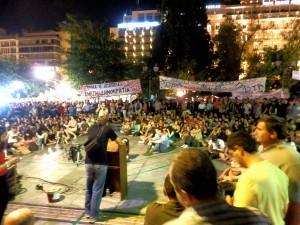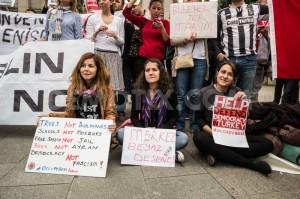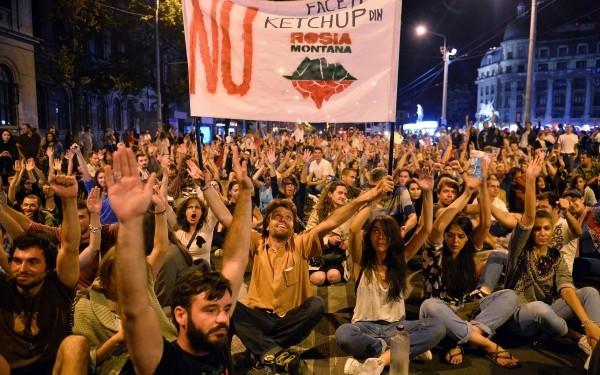By Cosmina Bajan
In a world in full process of globalization, when economy and politics are disputing the first position in the complex category of criteria upon which we can compare a country, cultural and traditional patterns seem to be obsolete Yet, if we really want to understand what lies behind the acting in a certain way or non-acting at all in the case of different societies we need to return to culture and traditions. And no matter the fact that economically and politically we share the Western model, in the Oriental part of Europe (the Balkans, the Caucasus and Turkey) the culture, traditions and way of understanding and putting into practice social action generate a different approach of the society on different topics such as sustainable development environmentalism and European citizenship.
Protesting for the sake of the emotions
The recent situation in Taksim Istanbul, the taking off from the public authorities of the Navarinou Park in Athens in 2008 and also other protest actions coming from different groups of the civil society in other countries of what we generically call South – Eastern Europe proved the fact that we are different, we act differently and have a different vision on the result of our social actions than in the West. In the Balkans like everywhere else, protests start with the deep dissatisfaction of a small community of people related to actions of public administration that directly affect their daily life. And usually they continue and became bigger and bigger because of the abuse of power from the authorities. So far, so good, we are in lined with the standard model…
I was asking some time ago someone from Turkey about the meaning of what happened in Taksim and the portrait of the protester: What did you wanted to prove? And who was going out on the street? He told me that the street protests begin as a spontaneous gathering of people in solidarity with the victims of the first days and that from the young students living in the big cities to the old traditional citizens of the faraway provinces, everybody joined this mass movement and felt the need to make visible the problems their are confronted with, their hopes and ideals for the future. They also wanted to show the political class that they can be united and that united they are unstoppable. And the same goes for every action initiated in the Balkans, Caucasus or other East European state.
The curious thing is that in this area people rarely had precise and pragmatic reasons for mass social action. They very rarely want to change the direction or the policy of the leaders, the laws or unwritten customs of their state. Here we know that the rules and laws are made to be broken and have no real interest in becoming pragmatic. In the Oriental part of Europe we protest and go in mass in the street mostly in order to show the solidarity we have with each other, to prove ourselves and the politicians and the whole world that we are united in our emotions and traditions and culture. Maybe for many Westerners trying to understand this way of being it is hard not to say impossible.
Oriental environmentalism
Environmental protection and environmentalism are very strongly related to social action and protest because the first movements supporting this topics were actually protesting movements. This is why I am inclined to assume the fact that the more a society is inclined towards social action and protesting, the more that society is also concerned with environmental issues.
The Balkans and the South-East part of Europe is culturally and traditionally more close to the Orient than to the Occident. If institutionally and from the perspective of the political and economical models, the states here are Occidentals, from the perspective of the mentalities, traditions, cultural patterns and organization of the society the Oriental model prevails. This is why, related to the very popular and important topic of environmental protection and sustainability, the approach in this part of Europe should be different than in the case of the Western countries.
Sustainable development is an operational concept stating the fact that nowadays and in the future we should balance in the development of the humankind the political, economical, social and environmental factors. So, politicians, economical actors – such as the companies in the public and private sector – and the civil society should work together in order to help nature and protect the environment and the people. It is the society the one that makes the difference between West and East. If in the West the members of the society are more sensitive to the idea of duty and order, in the East if you want to make the members of the community react upon issues such as selective recycling, saving energy and water and so on it is far more complex and difficult. Balkan people need to be co-interested in a different way than the Westerners in order to cooperate and start applying all the rules and routines of the sustainable development and environmentalism.
In a discussion with one of the most motivated and active coordinators of a non-formal group in Greece we both reached the conclusion that in Greece and Romania as long as the citizens don’t notice the problem of not taking care of the environment in their pocket – in the sense that they observe that money is taken from them if they don’t follow the rules or their interests and lifestyle or comfort is damaged – nobody or very few true environmentalists will do something on their own for the sake of nature. And the same goes for all the other countries in this area. For centuries here we have been so many nations living together in a cosmopolitan atmosphere with always someone from outside „guiding” us and imposing the rules that we had to follow. Finally we got free of this situation but some of the good and some of the bad practices of that period are still in the genetic code of our societies. It is what we are: an amazing mixture of new and old, of modern and traditional of noise and relaxation, of altruism and egoism, of wisdom and madness. And I strongly believe that like every time, the societies in the South-Eastern part of Europe will find their own different way trough the path of sustainable development and environmentalism. It would not hurt if they can keep in mind while searching the path, the wisdom of a Greek proverb saying that a society grows great when old men plant trees whose shade they know they shall never sit in.
Author’s note: This article was written before the manifestations against the exploitation in Rosia Montana took place in the big cities of Romania, nevertheless I hope that what is happening in Bucharest and other big cities will be as successful as it was in Turkey and also prove the validity of the arguments of this article.



